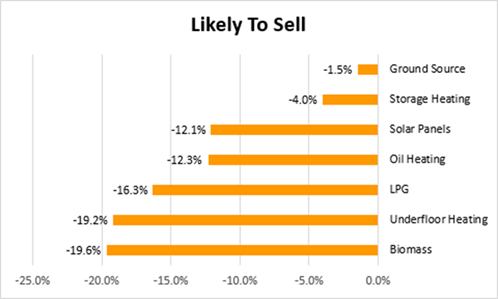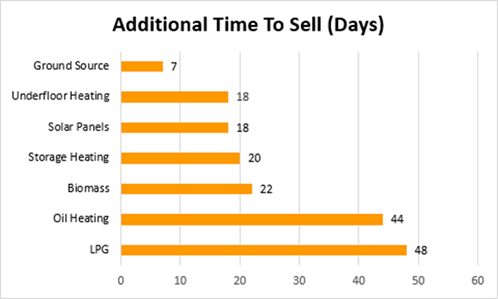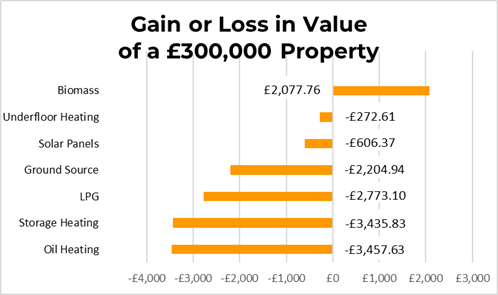Climate change is now a huge concern for a massive proportion of the public. With stories of climate catastrophe dominating the news agenda, many of us are looking out for ways to improve our carbon footprint and reduce our impact on the environment. But how do our concerns about climate change affect the buying decisions we make in the property market?

Our team decided to dive straight into the issue, researching how energy efficiency affects the sale-ability of properties. And the results might surprise you.
When compiling this research, our team focused on properties with alternative energy characteristics, including:
- Oil Heating
- Storage Heating
- Ground Source Heat Pumps
- LPG
- Underfloor Heating
- Biomass
- Solar Panels
How likely are sales for properties with alternative energy characteristics?
With environmental concerns beginning to impact the buying decisions we make in our day to day lives, you might think it safe to assume that alternative energy characteristics would make properties more likely to sell. But this simply isn’t the case.
The research found that properties with any one of our listed alternative energy systems were in fact less likely to sell than traditional homes. The impact of the energy system in question is important to note, as some had more of a negative effect than others.
At the moment, the probability of a sale for any property going onto the market is 59%. If a property has alternative energy provisions, this decreases.
The biggest impact was seen in homes with biomass energy, where properties were 19.6% less likely to sell. Properties with underfloor heating and LPG systems were 19.2% and 16.3% less likely to be sold respectively. The smallest impact was for ground source energy, which made a property 1.5% less likely to sell.
How do alternative energy characteristics affect sale times?
Not only are properties with alternative energy characteristics less likely to sell, they also take longer to sell. Properties with the energy features we listed took longer to sell on average than similar counterparts with more traditional energy features.
Currently, the average time taken to sell a property in the UK is 175 days (25 weeks). This is defined as the lag from first marketing the property with an agent to the final move in date.
Properties with Ground Source Heat Generation only take 7 days longer to sell when compared to properties without this feature. However, LPG and Oil heating add a further 44 days+ to the sale date.
How do alternative energy characteristics impact the value of properties?
Of course, many homeowners won’t be too discouraged by a slightly longer sale time, if a good price can be achieved. But what impact do alternative energy sources have on the final sale prices agreed for properties?
To answer this question, our team calculated the difference in the percentage of the asking price that properties achieved, and then worked this back to a value based on an average £300,000 property sale. The chart below shows the loss or gain in value achieved by each of the alternative energy characteristics we examined. 
Our research revealed that the only energy feature that does have a positive impact on prices is Biomass. For these properties, an average financial gain of £2,077 was achieved.
Other energy features tended to lead to a financial loss. The greatest loss was for oil heating, which led to an average drop in prices of £3,457. Similarly, an average drop in value of £3,435 accompanied properties with storage heating.
---
The data has revealed a definite preference for ‘normal’ energy features in properties, despite increasing numbers of us growing concerned about the impact of our actions on the planet.
Properties with alternative energy features have proven less likely to sell, and when they have sold, they have tended to take longer to sell. Overall, they have also been sold for a lower price than they would have done if they had a more traditional energy system.
So, the truth is that alternate energy systems do not yet make a property more desirable. But as consumer concerns grow, it’s possible that these systems might start to feature more highly on homemovers’ wish lists. Not only that, government support for energy efficient solutions could mean that interventions are made to ensure the market works better for environmentally friendly homes and for the planet.




